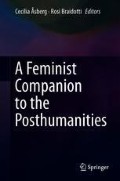Abstract
This article offers an original analysis of contemporary representations of evolutionary theory. It does so by turning to the lesser-known work of evolutionary biologist Richard Goldschmidt, who placed the “hopeful monster” at the heart of evolution. Diverging from the critiques of evolutionary theory as a colonial, able-ist, racist and misogynist discourse, this article proposes Goldschmidt’s The Material Basis of Evolution as the potential to reconfigure feminist, postcolonial, crip and queer approaches to narratives of origins. Focusing on the ever-rising presence of macromutation in contemporary literary and visual texts, this article offers an important contribution to feminist, postcolonial, crip and queer thinking on inter-and intra-relationality between species and environments, on difference, and on the temporality of species development. It situates its analysis of Hiromi Goto’s Hopeful Monsters in contemporary Canadian politics of colonisation, multiculturalism and the increased medicalisation of racialised and disabled bodies. In so doing, if offers a considerable contribution to the analysis of the necropolitical landscape of postcolonial belonging, addressing how little known theories of evolution may challenge such structural inequalities and violence.
Notes
- 1.
I use the form “non/human” for the reasons explained by Giffney and Hird (2008).
- 2.
The quotation is referenced in the acknowledgements as from Gould (1977).
- 3.
See Shildrick (2002) on the clean and proper body.
- 4.
In Shildrick’s words: “I read the monstrous, along with Haraway and Derrida, as hopeful, the potential site of both a reconceived ontology, and a new form of ethics” (2002, 131).
References
Ahmed, Sara. 2006. Queer phenomenology: Orientations, objects, others. Durham, NC: Duke University Press.
Alaimo, Stacy. 2010. Bodily natures: Science, environment, and the material self. Bloomington: Indiana University Press.
Braidotti, Rosi. 2011. Nomadic subjects: Embodiment and sexual difference in contemporary feminist theory. New York: Columbia University Press.
Dinshaw, Carolyn, Lee Edelman, Roderick A, Ferguson, Carla Freccero, Elizabeth Freeman, Judith Halberstam, Annamarie Jagose, Christopher Nealon, and Tan Hoang Nguyen. 2007. Theorizing queer temporalities: A roundtable discussion. GLQ 13(2–3): 177–195.
Franklin, Sarah. 2000. Life itself: Global nature and the genetic imaginary. In Global nature, global culture, eds. Sarah Franklin, Celia Lury, and Jackie Stacey, 188–227. London: Sage.
Garland-Thomson, Rosemarie. 1996. Introduction: From wonder to error – A genealogy of freak discourse in modernity. In Freakery: Cultural spectacles of the extraordinary body, ed. Rosemarie Garland-Thomson, 1–19. New York: New York University Press.
Giffney, Noreen, and Myra J. Hird. 2008. Introduction: queering the non/human. In Queering the Non/Human, eds. Noreen Giffney, and Myra J. Hird, 1–16. Abingdon: Ashgate.
Goldschmidt, Richard. 1940. The material basis of evolution. New Haven, CN: Yale University Press.
Goto, Hiromi. 2004. Hopeful monsters. Vancouver: Arsenal Press.
Gould, Stephen Jay. 1977. The return of hopeful monsters. Natural History 86:22–30.
Grosz, Elizabeth. 2008. Darwin and feminism: Preliminary investigations for a possible alliance. In Material Feminisms, eds. Stacy Alaimo, and Susan Hekman, 23–51. Bloomington, IN: Indiana University Press.
Haraway, Donna. 1992. The promises of monsters: A regenerative politics for inappropriate/d others. In Cultural Studies, eds. Lawrence Grossberg, Cary Nelson, and Paula A. Treichler, 295–337. New York: Routledge.
Haraway, Donna. 2007. When species meet. Minneapolis: University of Minnesota Press.
Heroes. 2006–2010. DVD, created by Tim Kring. Universal Media Studios.
Hird, Myra J. 2009. The origins of sociable life: Evolution after science studies. London: Palgrave Macmillan.
McClintock, Anne. 1995. Imperial leather: Race, gender and sexuality in the colonial conquest. New York: Routledge.
Shildrick, Margrit. 2002. Embodying the monster: Encounters with the vulnerable self. London: Sage.
Stoler, Ann Laura. 2000. Race and the education of desire: Foucault’s history of sexuality and the colonial order of things. Durham, NC: Duke University Press.
Tyler, Imogen. 2001. Celebrity, pregnancy and subjectivity. In Thinking Through the Skin, eds. Sara Ahmed, and Jackie Stacey, 69–83. London: Routledge.
X-Men. 2000. DVD, directed by Bryan Singer. Twentieth Century Fox.
X-Men: The Last Stand. 2006. DVD, directed by Brett Ratner. Twentieth Century Fox.
Author information
Authors and Affiliations
Corresponding author
Editor information
Editors and Affiliations
Rights and permissions
Copyright information
© 2018 Springer International Publishing AG, part of Springer Nature
About this chapter
Cite this chapter
McCormack, D. (2018). Queer Disability, Postcolonial Feminism and the Monsters of Evolution. In: Åsberg, C., Braidotti, R. (eds) A Feminist Companion to the Posthumanities. Springer, Cham. https://doi.org/10.1007/978-3-319-62140-1_13
Download citation
DOI: https://doi.org/10.1007/978-3-319-62140-1_13
Published:
Publisher Name: Springer, Cham
Print ISBN: 978-3-319-62138-8
Online ISBN: 978-3-319-62140-1
eBook Packages: Religion and PhilosophyPhilosophy and Religion (R0)

